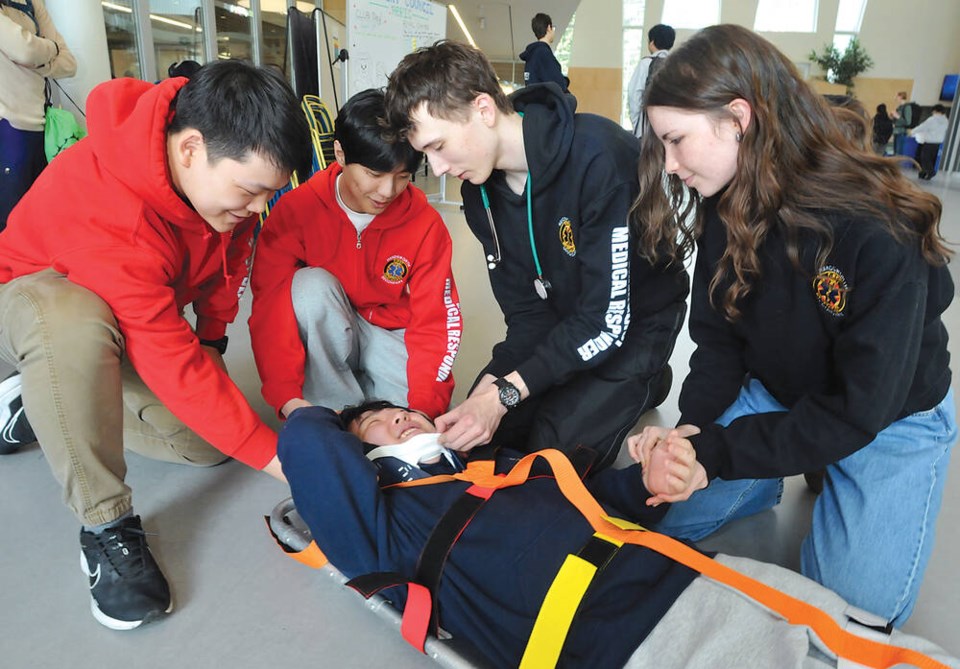For most high school students, when their electronic device is buzzing, it’s a distraction their teachers would rather they ignore.
For the members of Handsworth Secondary’s First Responder’s Club, it’s an urgent call to action.
“In the event that there’s any sort of emergency or first aid need among students, we carry pagers and we get called down to assist. We have first aid kits, oxygen tanks, anything that’s needed to help out our fellow students in their times of need,” said Zeyus Spenta, a Grade 12 volunteer with the group.
The team is typically called on once every three or four days – although sometimes they rack up three or four calls in just a single day, said Christopher Gawlick, co-president of the group. Rugby games tend to be busy.
“We do all sorts of calls. We’ve gone from as little as a cuts, scrapes and sprained ankles, all the way to spinal injuries, seizures, unconscious collapses, ambulance calls, major trauma,” he said.
Joining the club involves quite a bit more than filling out an application. The group is overseen by the Emergency Services Institute of Canada. The minimum level of training required to be eligible is standard intermediate first aid – a 16-hour course offered by the Red Cross. Many of the group’s members have lifeguard training over and above that. A handful have the same level of training as a Metro Vancouver firefighter and a few have emergency medical responder status, which takes 80 to 100 hours of training and certification – the same level required to be a paramedic in remote areas of the province.
In almost all cases, that training is done on the students’ own time and own dime.
“People do it because they have a passion and they want to help their fellow students out,” Spenta said.
Currently there a four similar First Responder Clubs at North Shore high schools, and the Handsworth team is in the process of helping to launch another one at Argyle Secondary.
Bizarrely, the schools’ insurance doesn’t cover teachers providing that level of care to students – just other teachers. Some schools have nurses on staff, but that is a luxury, Gawlick said.
In any event, students who have gone through the training are all too eager to help, with the support of the school.
“All of our teachers are on board with it, and very supportive,” Gawlick said. “The admin team has been awesome about making sure that we don’t miss too much school, and that we can get caught up whenever we need to, as well as providing us with all the financial and other supports that we need.”
Handsworth principal Cary Hungle said having students with that level of expertise provides some peace of mind.
“It’s exceptional having a team like that. They’re a highly committed and valuable team in the school. We’re very lucky at Handsworth to have students that take on that role,” he said.
More than the practical benefits, Hungle said he is impressed with the leadership skills the students are demonstrating, serving as role models and setting themselves up for future success.
“They’re enthusiastically trying to further their learning and their practice,” he said. “They’re running their own trainings. They’re bringing more people on board. They’re advertising Narcan trainings for the general student population or staff.”
Unsurprisingly, many of the students on the team plan to work in similar fields after graduation.
Several alumni are on track for medical school. Gawlick is planning to start formal training to be a paramedic in the fall.
More than bandages and slings, students often are often in need of a bit of “psychological first aid,” Spenta said – a compassionate voice to reassure them. It is always appreciated, he added.
“They’re supportive. They’re respectful and they know that we’re here to help their classmates and their peers,” Spenta said. “You get satisfaction and fulfillment helping.”
Gawlick also flagged something that professional first responders will also tell you gets them out of bed in the morning.
“When that pager goes off, it’s just an adrenaline rush. What’s going on? How can I best help this person?” he said. “I absolutely love doing first aid.”
[email protected]
twitter.com/brentrichter
brentrichter.bsky.social
Want to stay updated on North Vancouver and West Vancouver news? Sign up for our free daily newsletter.



